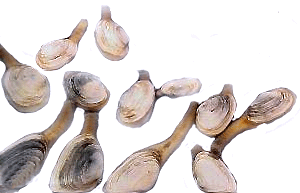|
|
|
||||||
|
|
 Softshell Clams Mya arenaria Ipswich Clam, Belly Clam, Piss Clam, Fryer, Steamer, Long Neck, Maninose Clam Recognized by New Englanders as the true clam, these are found north of Cape Cod all the way to the Artic Ocean with most of the harvest coming north of Boston. The flavor of the soft clam is more subtle than that of hard clams like the Quahog with a sweet slightly salty flavor. The large clam bellies have a soft and tender texture. At an average size of 3 to 4 inches, the soft shelf is not truly soft but thin and brittle. Soft-shells have an open shell that cannot close completely because of the protruding siphon and for this reason their clam has a shorter shelf life than its hard shell cousin. The open shell also means they must be checked carefully before service for sand. If clams are placed in water that consists of 1/3 cup of salt to each gallon of water along with a cup of corn meal they will purge their stomachs which will rid themselves of the grit with in a couple of hours. The siphon or neck is covered with a dark membrane that must be removed prior to being cooked or eaten. Soft clams are marketed live in the shell. The shell of the clam should be whole and clean and the siphon or neck firm and plump and moist not dry. If they do not pull their neck in when tapped they are not alive and should be used.
Because clams are filter feeders, they concentrate toxins and bacteria from polluted waters. During outbreaks of red tide (algal blooms) they also collect the microorganism that causes paralytic selfish poisoning (PSP). For this reason you must only purchase clams and other shellfish from reputable sources that you know adhere to the federally mandated safeguards.
|
||||||
|
|
|||||||
